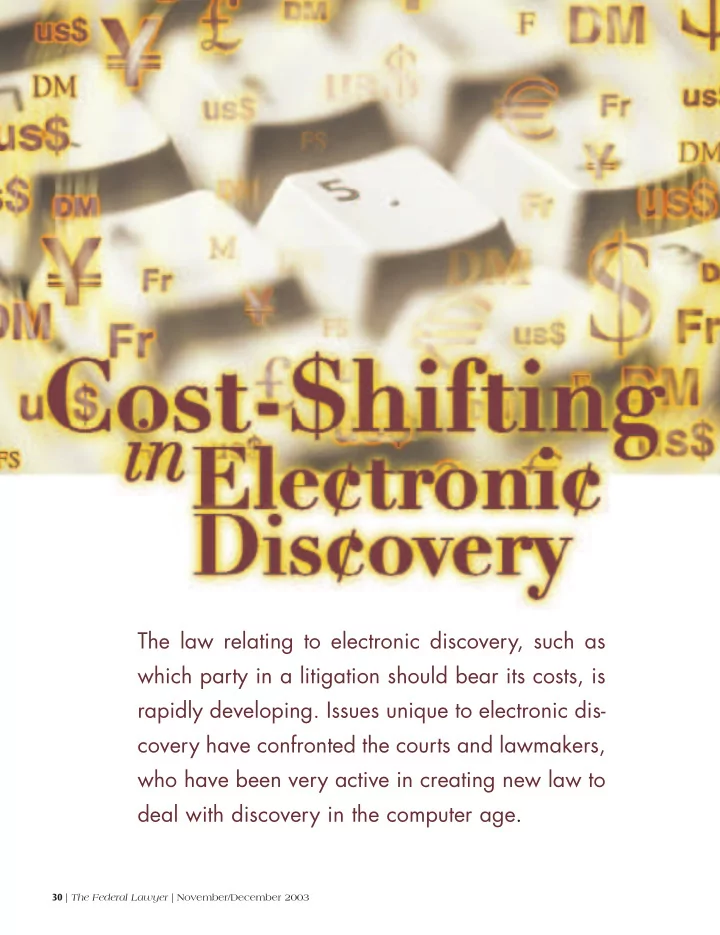

The law relating to electronic discovery, such as which party in a litigation should bear its costs, is rapidly developing. Issues unique to electronic dis- covery have confronted the courts and lawmakers, who have been very active in creating new law to deal with discovery in the computer age. 30 | The Federal Lawyer | November/December 2003
Ripples on the $hores of Zubulake : Pra¢tice Considerations from Re¢ent Ele¢troni¢ Dis¢overy De¢isions By Jonathan M. Redgrave and Erica J. Bachmann Because relatively few reported cases have addressed types and sizes. Indeed, opinions are already being issued the issue of cost-shifting in electronic discovery cases at regarding spoliation of electronic evidence that should raise alarm bells for counsel and clients. 7 length, the recent decisions from the Southern District of New York in Zubulake v. UBS Warburg LLC (addressed in 2) Understand the world of electronic discovery . detail in the accompanying article, “Passing the Buck: Cost- While many vendors and software manufacturers assert Shifting in Electronic Discovery”) will have a significant im- that electronic discovery is easy and forensic examinations pact. In addition, both the extensive treatment of cost-shift- should be conducted on every computer, the real world of ing principles provided in these opinions and careful dis- potentially thousands of computers and huge volumes of tinctions drawn between cost-shifting in Zubulake and ap- different types of data defies such simplistic assertions. proaches applied in prior cases contribute to the frame- Moreover, the implementation of either the Rowe test or work to guide the factual and legal analyses needed to ad- the Zubulake test presupposes that accurate and reliable dress the costs of electronic discovery in other cases. 1 information, often about the detailed aspects of data ex- Further, Judge Scheindlin, who issued both the Zubulake traction and processing, will be presented to the court. Ac- decisions, is recognized as one of the leading jurists con- cordingly, counsel must be cognizant of not only electronic sidering electronic discovery issues and currently serves on discovery but also the details so that they can communicate the Discovery Subcommittee of the Advisory Committee on effectively with clients, vendors, other counsel, and the Civil Rules. Finally, the Zubulake opinions have been courts. widely cited in press and trade publications (often to imply 3) Understand Rule 26(b)(2) and Rule 26(c) . The that cost-shifting will become far more difficult in the fu- decisions in Rowe and Zubulake are essentially based upon ture, although that is not a necessary implication of the de- the touchstone concept of proportionality embodied in the cisions). Federal Rules of Civil Procedure. Importantly, cost-shifting As noted by Carangelo and Graham, prior to the Zubu- is but one of the mechanisms that the court has at its dis- lake decisions, the most widely cited case addressing cost- posal to address burden issues. Rule 26(b)(2) grants broad shifting for electronic discovery was Rowe Entertainment discretion to the trial court to guide discovery, and the Inc. v. William Morris Agency Inc. 2 Rowe established an court is empowered to limit the frequency and/or extent of eight-point test to balance factors to determine which party discovery sua sponte or on motion by a party under Rule should bear the costs of electronic discovery. 3 Many courts 26(c). 8 Rule 26(c) specifies a nonexclusive list of provisions have invoked Rowe on the question of cost-shifting. 4 that could be adopted in a protective order, including: Zubulake , however, relied on a modified version of Rowe ’s eight-point test. 5 It remains to be seen if the Zubulake (1) that the disclosure or discovery not be had; opinions will be viewed as a divergence from Rowe and its (2) that the disclosure or discovery may be had only on progeny, or if a new approach will emerge based on specified terms and conditions, including a designation Zubulake . of the time or place; At a minimum, Zubulake and Rowe highlight the critical (3) that the disclosure or discovery may be had only by a need for litigators to consider the following points with re- method of discovery other than that selected by the spect to electronic discovery disputes. party seeking discovery; 1) Do not ignore electronic discovery. Courts are in- (4) that certain matters not be inquired into, or that the creasingly impatient with parties and counsel who do not scope of the disclosure or discovery be limited to cer- understand the potential relevance and importance of elec- tain matters; tronic records in litigation, as well as the means by which (5) that discovery be conducted with no one present ex- responsive data will be identified and produced. As more cept persons designated by the court; … secondary materials are published 6 and additional courts (7) that a trade secret or other confidential research, de- issue published opinions, it will be more difficult for par- velopment, or commercial information not be revealed or revealed only in a designated way; … 9 ties to ignore electronic discovery issues in litigation of all November/December 2003 | The Federal Lawyer | 31
Recommend
More recommend